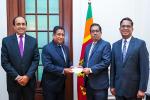Anshari Perera - Head of Sector Research & Lead Macro Economic Analyst and Chayu Damsinghe - Product Head Macroeconomic & Thematic Research of Frontier Research (Pvt) Ltd were the resource persons for the session.
In her presentation, Anshari Perera said that the near-term economic outlook is very ambiguous as it is tied to the political nuances in the country and that there can be a significant amount of volatility over the next few months depending on how the situation unfolds.
She added that political situation and the negotiations with the IMF are two key factors that will have a significant impact on how Sri Lanka’s economy will perform in the near-term as well as from a longer-term perspective.
“The IMF is important in bringing back confidence and improving the sentiment – particularly the foreign investor sentiment - towards Sri Lanka.
From a political perspective, if we have a stable government that can continue throughout this period, it will immensely help with the IMF negotiations and the debt restructuring process.
Anshari went ahead to comment that Sri Lanka is not unique in the situation it is in.
Many other economies have undergone similar experiences in the past 10-15 years.
IMF’s importance at this juncture can be understood by studying the experience other countries have had in similar currency and debt crises and how they have manoeuvred their economies back to health with the backing of the IMF.
She mentioned that countries which have continued with the IMF programme for at least two years have seen spiralling inflation fall back to below 15% and cut back on money printing with tight monetary and fiscal policy reforms such as interest rate increases and restructuring of taxes.
An IMF programme will also support an inflation rate slow-down and stabilization of exchange rates” she said adding that while Sri Lanka can recover from this crisis and come out stronger like some of the other countries, the recovery will not be a “V” shaped fast recovery.
Chayu Damsinghe commented that the crisis that Sri Lanka is going through is not necessarily rare or uncommon.
He mentioned that the recovery witnessed by other countries gives optimism even though the trajectory of recovery may be mid to long term.
While some countries like Venezuela and Zimbabwe underwent a hyper-inflationary period, most countries recovered, some quite strongly, having undergone varying levels of pain.”
“In 1991 India experienced its Gross Fiscal Deficit rising which was financed through increased borrowings.
India saw its reserves falling from USD 3.11 billion at the end of August 1990 to USD 891 million by mid-January 1991 causing massive problems across India.
The economic crisis fuelled a political upheaval too with India appointing four prime ministers from 1989 to 1991.
It was PM Narsimha Rao’s Government that was credited for having implemented the necessary reforms for India to come out of the crisis.”
“Across this period, the currency depreciated quite heavily across a series of devaluations.
Interest rates were also high although not as high as in Sri Lanka” he added.
He also highlighted that India was facing the same issues that Sri Lanka is currently facing such as foreign lenders becoming reluctant to lend money, non-availability of forex to import essentials such as fuel and fertiliser, an adjustment of the exchange rate which was put in place to discourage the import of non-essential items while encouraging non-residents to send more money to their local bank accounts.
The reforms package promulgated by the then PM of India to make them self-reliant with the ability to pay for their imports with their own exports, liberalising government regulation and controls which hindered economic activity and employment opportunities, reducing rural urban disparities, ensuring social justice and the misuse of government concessions with those other than the poor and needy enjoying the benefits does resonate with the discussions that are now taking place in Sri Lanka.






















